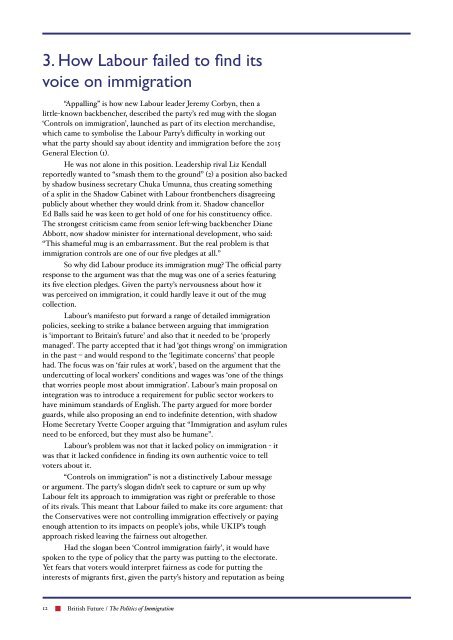THE POLITICS OF IMMIGRATION
The-politics-of-immigration
The-politics-of-immigration
You also want an ePaper? Increase the reach of your titles
YUMPU automatically turns print PDFs into web optimized ePapers that Google loves.
3. How Labour failed to find its<br />
voice on immigration<br />
“Appalling” is how new Labour leader Jeremy Corbyn, then a<br />
little-known backbencher, described the party’s red mug with the slogan<br />
‘Controls on immigration’, launched as part of its election merchandise,<br />
which came to symbolise the Labour Party’s difficulty in working out<br />
what the party should say about identity and immigration before the 2015<br />
General Election (1).<br />
He was not alone in this position. Leadership rival Liz Kendall<br />
reportedly wanted to “smash them to the ground” (2) a position also backed<br />
by shadow business secretary Chuka Umunna, thus creating something<br />
of a split in the Shadow Cabinet with Labour frontbenchers disagreeing<br />
publicly about whether they would drink from it. Shadow chancellor<br />
Ed Balls said he was keen to get hold of one for his constituency office.<br />
The strongest criticism came from senior left-wing backbencher Diane<br />
Abbott, now shadow minister for international development, who said:<br />
“This shameful mug is an embarrassment. But the real problem is that<br />
immigration controls are one of our five pledges at all.”<br />
So why did Labour produce its immigration mug? The official party<br />
response to the argument was that the mug was one of a series featuring<br />
its five election pledges. Given the party’s nervousness about how it<br />
was perceived on immigration, it could hardly leave it out of the mug<br />
collection.<br />
Labour’s manifesto put forward a range of detailed immigration<br />
policies, seeking to strike a balance between arguing that immigration<br />
is ‘important to Britain’s future’ and also that it needed to be ‘properly<br />
managed’. The party accepted that it had ‘got things wrong’ on immigration<br />
in the past – and would respond to the ‘legitimate concerns’ that people<br />
had. The focus was on ‘fair rules at work’, based on the argument that the<br />
undercutting of local workers’ conditions and wages was ‘one of the things<br />
that worries people most about immigration’. Labour’s main proposal on<br />
integration was to introduce a requirement for public sector workers to<br />
have minimum standards of English. The party argued for more border<br />
guards, while also proposing an end to indefinite detention, with shadow<br />
Home Secretary Yvette Cooper arguing that “Immigration and asylum rules<br />
need to be enforced, but they must also be humane”.<br />
Labour’s problem was not that it lacked policy on immigration - it<br />
was that it lacked confidence in finding its own authentic voice to tell<br />
voters about it.<br />
“Controls on immigration” is not a distinctively Labour message<br />
or argument. The party’s slogan didn’t seek to capture or sum up why<br />
Labour felt its approach to immigration was right or preferable to those<br />
of its rivals. This meant that Labour failed to make its core argument: that<br />
the Conservatives were not controlling immigration effectively or paying<br />
enough attention to its impacts on people’s jobs, while UKIP’s tough<br />
approach risked leaving the fairness out altogether.<br />
Had the slogan been ‘Control immigration fairly’, it would have<br />
spoken to the type of policy that the party was putting to the electorate.<br />
Yet fears that voters would interpret fairness as code for putting the<br />
interests of migrants first, given the party’s history and reputation as being<br />
12 British Future / The Politics of Immigration


